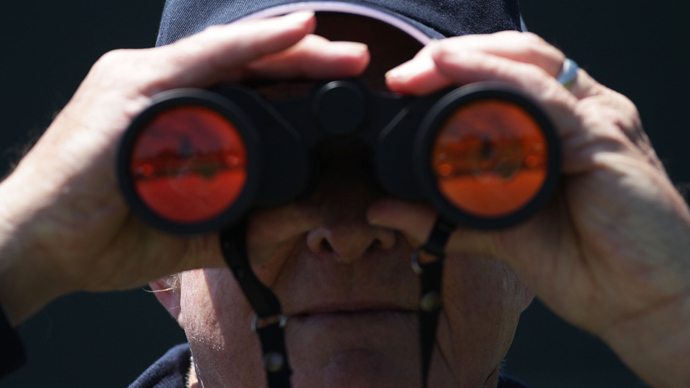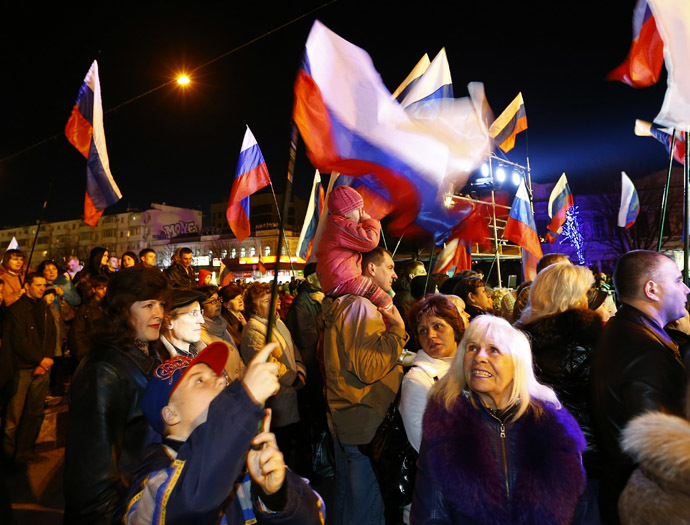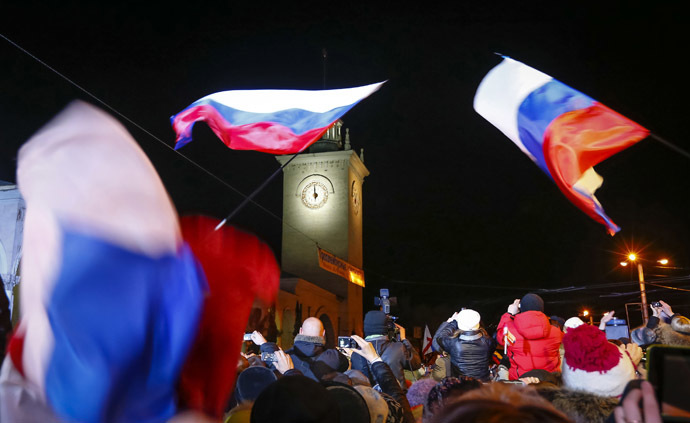‘US looking for a major enemy to justify its defense spending'

As US spending on defense reaches $1 trillion a year and defense giants such as Boeing gain increased lobbying power, the US must justify this money by creating tangible enemies around the world, political analyst Patrick Hennigsen told RT.
RT:Why do some people in America say they were surprised at the speed Russia moved on Crimea?
Patrick Hennigsen: Personally I tend to be skeptical about press briefings or PR balloons coming out of Washington, especially around a crisis like this. Unless of course they were completely asleep at the wheel, or were totally incompetent, I find it hard to believe that they couldn’t have predicted at least a Crimea referendum result because of the crisis in Kiev.
So, even I in February said that Ukraine may be partitioned into two or three parts as a result of this crisis. But experienced intelligence analysts in the State Department or the CIA would have war-gamed five or six different possibilities, or any reaction as a result of an action taken with regime change in Kiev.
So it’s quite unbelievable that this would have quote, unquote, taken them by surprise. But this suits the priorities of the Pentagon in Washington, being able to talk up military confrontation in order to increase spending on defense organizations, to increase contracts which are going to be reviewed this year with the Pentagon and other defense organizations.
So it doesn’t surprise me. Even though they’ve made this statement, it’s quite disingenuous in my opinion.
RT:Has the US administration miscalculated? What and who are influencing America’s foreign policy with regard to Russia?
PH: I think throughout recent history, at least if not the whole of the last 30 to 40 years, the United States will never admit that it’s made a mistake or that any of the policies that it instituted have had a negative effect on the world. So that doesn’t surprise me, but certainly there are a lot of opportunists who stand to gain incredibly financially as a result of the crisis, a confrontation, a reigniting of the Cold War with Russia.
Currently the new United States is looking for an enemy, a major enemy, which they need to justify upwards of $1 trillion a year in total if you look at it in defense spending. And these are contracts that belong to corporations that are very powerful, as lobbies in Washington DC they hold incredible influence over political leadership, that is the system right now in the United States and Washington DC and so it shouldn’t surprise anybody that the opportunists are now jumping on board in the media and the corporate lobbies that really determine the agendas, the foreign policy agendas that are laid out by our political leadership in Washington DC.

‘Decision to join Russia was a no-brainer for Crimea’
RT:Why do you think Crimean people voted in such large numbers to become part of Russia?
PH: Well, if you put aside general anti-Russian propaganda that is running rife right now regarding Russia being a “corrupt country,” a “dictatorship,” you look at the international organizations that have been monitoring elections in Russia and have commented on how transparent they are, how well organized they are. From a Crimean population’s stand point it’s a no-brainer. If you put yourself in their position you’re looking north and you’re seeing the total destabilization and the collapse of rule, the collapse of government. A complete economic collapse in Ukraine as a result of what happened in Kiev. So hence you have a huge voter turnout, an incredible landside of a majority.
And any person in the world would make a similar decision. If Northern Ireland had to make a decision because the government in London collapsed, neo-fascists took over at gunpoint in London, and people of Northern Ireland could have a referendum, of course they would join the south; they would join the Republic of Ireland for their own personal stability, for their own safety. So it’s not that big of a stretch when you look at it from a larger perspective.
RT:How can the fact be explained that the transition of the military in Crimea went so smooth? As you know, just a few Crimean soldiers decided to return to Kiev, while others joined the Russian army.
PH: The transition militarily in Crimea shouldn’t surprise anybody, because between the Ukraine and Russia you have over two decades of cooperation, military cooperation from the top brass, down to the soldiers who were doing drills together and maneuvers together for 20 years and even further back when you count the time of the Soviet Union. So Russia’s military presence goes back centuries in the Crimea. So when you look at it from that perspective, it shouldn’t surprise anybody that there would be a relatively smooth transition. I can’t believe any Ukrainian soldiers have any desire, nor do any Russian soldiers, to be firing at each other. Especially as they’ve had such a close and friendly and cooperative relationship in recent decades.

‘US leadership has little respect for Iraq’
RT:Why did Obama compare Iraq to Crimea? Could those two cases actually be compared?
PH: Those comments by President Obama are very sad comments in respect to the Iraqi people. I think comments like that really demonstrate how little respect to the US leadership really has for the country of Iraq and for its people and they seem to forget the huge price that the Iraqi people paid in blood, paid in culture, paid economically for the designs of a handful of US transnational corporations and the Pentagon.
So to make such a statement, such an unequivocal statement, that has no basis really in reality. You can’t compare Iraq and the Crimea. How many Iraqis died since the first Gulf War? Two million, by some people’s estimations. To make that sort of comparison to me is intellectually sloppy and also very disrespectful to all the people who have paid the ultimate price for US foreign policy objectives in the Middle East.
RT:What do you think were Moscow’s aims in Crimea?
PH: I think in terms of Russian diplomacy regarding the Crimea, what you’re really talking about is the government in Moscow’s diplomacy and communication and relationship with the people of the Crimea. I don’t think it should surprise anybody if you look at the history of that part of the world, even Mikhail Gorbachev, who is considered by many in the West as a globalist, as an internationalist, said that the referendum in the Crimea corrected an old mistake, which was made under Nikita Khrushchev in the Soviet Union era. And that has been corrected that Crimea really should be a part of Russia and the people cast their ballots and they spoke quite loudly in fact and the result is in.
You have many other international commentators that would agree. The fact that the UN has not voted to recognize the result in terms of other opinion of UN countries is really disappointing. What the people themselves in that country have said and the argument in the West is that it’s in breach of the Ukrainian constitution. Frankly, the Ukrainian constitution ceases to exist the minute the government in Kiev was taken over at gunpoint, so all bets are off at that point. So it’s quite a disingenuous argument by the West to say that the referendum in the Crimea is in breach of the Ukrainian constitution, considering what happened in Kiev only weeks before.
The statements, views and opinions expressed in this column are solely those of the author and do not necessarily represent those of RT.
The statements, views and opinions expressed in this column are solely those of the author and do not necessarily represent those of RT.












